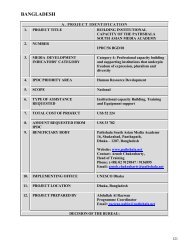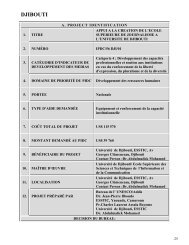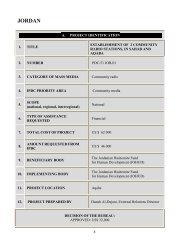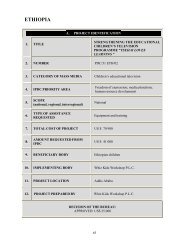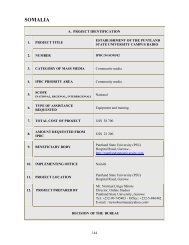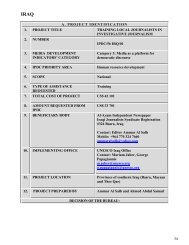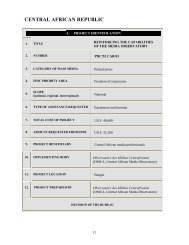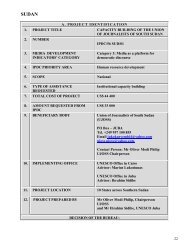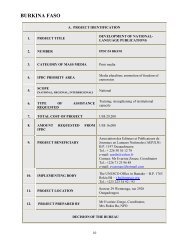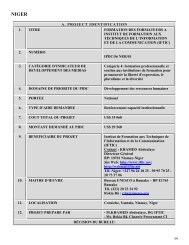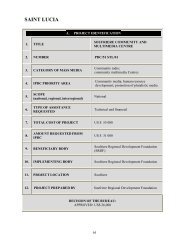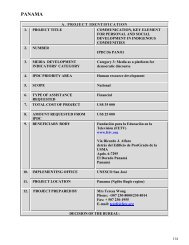Mauritania - Training for the Digitization of Radio Mauritanie's Audio ...
Mauritania - Training for the Digitization of Radio Mauritanie's Audio ...
Mauritania - Training for the Digitization of Radio Mauritanie's Audio ...
You also want an ePaper? Increase the reach of your titles
YUMPU automatically turns print PDFs into web optimized ePapers that Google loves.
MAURITANIA<br />
1.<br />
2.<br />
3.<br />
4.<br />
5.<br />
6.<br />
7.<br />
9.<br />
10.<br />
11.<br />
12.<br />
TITLE<br />
NUMBER<br />
CATEGORY OF MASS MEDIA<br />
IPDC PRIORITY AREA<br />
SCOPE<br />
(NATIONAL, REGIONAL, INTER-<br />
REGIONAL)<br />
TYPE OF ASSISTANCE REQUESTED<br />
TOTAL COST OF PROJECT<br />
AMOUNT REQUESTED FROM IPDC<br />
PROJECT BENEFICIARY<br />
IMPLEMENTING BODY<br />
PROJECT LOCATION<br />
PROJECT PREPARED BY<br />
A. PROJECT IDENTIFICATION<br />
TRAINING FOR THE DIGITIZATION OF<br />
RADIO MAURITANIE'S AUDIO ARCHIVES<br />
PDC/51MAU/03<br />
RADIO<br />
HUMAN RESOURCE DEVELOPMENT<br />
NATIONAL<br />
TRAINING & EQUIPMENT<br />
US$ 39,200<br />
US$ 34,200<br />
RADIO MAURITANIE<br />
RADIO MAURITANIE<br />
NOUAKCHOTT<br />
RADIO MAURITANIE<br />
DECISION OF THE BUREAU:<br />
APPROVED: US$ 34,200<br />
14
1. BACKGROUND AND JUSTIFICATION<br />
B. PRESENTATION<br />
The history <strong>of</strong> radio broadcasting in <strong>Mauritania</strong> is closely bound to that <strong>of</strong> <strong>the</strong> country itself. Since<br />
1958, <strong>the</strong> <strong>Mauritania</strong>n National <strong>Radio</strong> Service (<strong>Radio</strong> Nationale de la Mauritanie) has continuously<br />
<strong>of</strong>fered <strong>the</strong> public a wide variety <strong>of</strong> programs in support <strong>of</strong> vital issues such as education, public<br />
awareness, <strong>the</strong> dissemination <strong>of</strong> in<strong>for</strong>mation and entertainment. Since its earliest broadcasts out <strong>of</strong><br />
Saint Louis in Senegal, <strong>Radio</strong> Mauritanie has accumulated more than 20,000 hours <strong>of</strong> sound archives—<br />
stored on various types <strong>of</strong> media (magnetic tape, vinyl disc, cassette, etc.), documenting many<br />
important aspects <strong>of</strong> <strong>Mauritania</strong>n life (<strong>the</strong> independence <strong>of</strong> <strong>Mauritania</strong>, traditional music and stories,<br />
eloquent testimonies on <strong>Mauritania</strong>ns' daily lives, tales <strong>of</strong> ancient <strong>Mauritania</strong>n cities, historical political<br />
speeches, etc.). Today, however, <strong>the</strong> future <strong>of</strong> <strong>the</strong>se archives is seriously jeopardized, so much so that<br />
<strong>the</strong> implementation <strong>of</strong> a digital restoration and archiving programme is now urgently required.<br />
In <strong>the</strong> wake <strong>of</strong> <strong>the</strong> events <strong>of</strong> August 3rd, 2005, marked by <strong>the</strong> implementation <strong>of</strong> re<strong>for</strong>ms in <strong>the</strong><br />
communications sector, <strong>Radio</strong> Mauritanie acquired "public-service" status and, as such, is legally<br />
required to adhere to <strong>the</strong> principles <strong>of</strong> independence and freedom <strong>of</strong> in<strong>for</strong>mation and communication,<br />
and to provide equal treatment, in terms <strong>of</strong> access to airtime, to all political parties, trade unions and<br />
organisations <strong>of</strong>ficially recognized by <strong>the</strong> civil society. Although <strong>Radio</strong> <strong>Mauritanie's</strong> sound archives<br />
constitute a precious source <strong>of</strong> in<strong>for</strong>mation, access to <strong>the</strong>m is limited on account <strong>of</strong> <strong>the</strong>ir deplorable<br />
state, which renders <strong>the</strong>ir exploitation difficult, and in some cases, even impossible. Fully aware <strong>of</strong> <strong>the</strong><br />
importance and urgency <strong>of</strong> preserving its archives, <strong>Radio</strong> Mauritanie has already completed <strong>the</strong><br />
digitization <strong>of</strong> 50 magnetic tapes. These tapes were selected <strong>for</strong> <strong>the</strong>ir poor physical state and <strong>the</strong><br />
frequency <strong>of</strong> <strong>the</strong>ir use. In terms <strong>of</strong> digitization equipment, <strong>Radio</strong> Mauritanie already possesses tape<br />
recorders, a Dalet plat<strong>for</strong>m and digital audio workstations equipped with CD-ROM recorders.<br />
To be able to guarantee <strong>the</strong> long-term preservation <strong>of</strong> <strong>the</strong> entire stock <strong>of</strong> archives in a <strong>for</strong>m which is<br />
compatible with <strong>the</strong> station's digital audio production equipment, it is important to continuer <strong>the</strong><br />
process <strong>of</strong> transferring <strong>the</strong> sound archives to new digital media. This process should be conducted<br />
according to a general sound-archive safeguard plan once a complete inventory <strong>of</strong> <strong>the</strong> audio recordings<br />
has been completed. To ensure <strong>the</strong> success <strong>of</strong> <strong>the</strong> project, <strong>Radio</strong> Mauritanie would need to engage <strong>the</strong><br />
services <strong>of</strong> an international expert to conduct an assessment <strong>of</strong> <strong>the</strong> current situation. Once <strong>the</strong> archive<br />
safeguard plan has been established, <strong>Radio</strong> Mauritanie personnel would <strong>the</strong>n need to be trained in audio<br />
archiving techniques and in <strong>the</strong> use <strong>of</strong> relevant IT tools. Given that <strong>the</strong> future <strong>of</strong> <strong>the</strong> archives is<br />
intimately linked to <strong>the</strong> access to and use <strong>of</strong> <strong>the</strong> services provided, <strong>the</strong> station envisages <strong>the</strong><br />
establishment <strong>of</strong> small digitization unit and <strong>the</strong> creation <strong>of</strong> a database to ensure <strong>the</strong> continuity <strong>of</strong> <strong>the</strong><br />
archiving process and to enable consultation <strong>of</strong> <strong>the</strong> archives.<br />
2. DESCRIPTION OF THE TARGET GROUPS<br />
<strong>Radio</strong> Mauritanie employees, in particular <strong>the</strong> personnel <strong>of</strong> <strong>the</strong> archives unit (technicians and<br />
archivists). <strong>Mauritania</strong>n civil society as a whole would also benefit from this archiving programme in<br />
that <strong>the</strong>y would be able to consult and make use <strong>of</strong> <strong>the</strong> archives.<br />
15
3. IMMEDIATE OBJECTIVES<br />
Once <strong>the</strong> current state <strong>of</strong> <strong>the</strong> audio archives has been assessed and a audio-archive safeguard plan<br />
established, personnel from <strong>Radio</strong> <strong>Mauritanie's</strong> archives unit will receive highly specialized training in<br />
this field. They will also acquire pr<strong>of</strong>iciency in <strong>the</strong> tasks required <strong>for</strong> effective archive and database<br />
administration.<br />
4. DEVELOPMENT OBJECTIVES<br />
• Support <strong>the</strong> setting up and extension <strong>of</strong> a digital library and public archives service worthy <strong>of</strong><br />
today's in<strong>for</strong>mation society;<br />
• Support ef<strong>for</strong>ts aimed at <strong>the</strong> development and use <strong>of</strong> ICTs to safeguard national heritage assets<br />
with a view to rendering <strong>the</strong> latter accessible as an integral part <strong>of</strong> <strong>the</strong> current cultural<br />
landscape.<br />
5. PROJECT INPUTS<br />
Status assessment mission comprising <strong>the</strong> drawing up <strong>of</strong> an archive safeguard plan:<br />
Expert assessment mission to establish <strong>the</strong> current state <strong>of</strong> <strong>the</strong> archives and establish an administration<br />
plan <strong>for</strong> <strong>the</strong> archiving and digitizing processes. The expert assessment would include:<br />
• Determining how much time would be required to digitize <strong>the</strong> existing sound archives<br />
(estimated transfer time) and recommending archive <strong>for</strong>mats and media;<br />
• Conducting on-site tests on samples <strong>of</strong> <strong>the</strong> various types <strong>of</strong> currently existing media to assess<br />
<strong>the</strong> state <strong>of</strong> <strong>the</strong> media and <strong>the</strong> material to be transferred<br />
• Making recommendations as regards <strong>the</strong> transfer <strong>for</strong>mat and medium, estimating <strong>the</strong> amount <strong>of</strong><br />
time required <strong>for</strong> <strong>the</strong> transfer <strong>of</strong> <strong>the</strong> entire collection and estimating <strong>the</strong> required human and<br />
technical resources (hardware and s<strong>of</strong>tware);<br />
• Drawing up a plan <strong>for</strong> <strong>the</strong> administration <strong>of</strong> <strong>the</strong> transferred archives and <strong>the</strong> safeguard <strong>of</strong> <strong>the</strong><br />
original material;<br />
On-site training in audio archiving techniques and <strong>the</strong> use <strong>of</strong> relevant computer tools<br />
One-week course <strong>for</strong> 10 employees from <strong>Radio</strong> <strong>Mauritanie's</strong> archives department covering <strong>the</strong><br />
following topics:<br />
• Defining and selecting <strong>the</strong> most suitable copies <strong>for</strong> transfer<br />
• Determining whe<strong>the</strong>r or not cleaning is necessary and selecting <strong>the</strong> most appropriate method <strong>of</strong><br />
restoration<br />
• Classification <strong>of</strong> archives according to pre-defined administration plan;<br />
• Input <strong>of</strong> metadata into <strong>the</strong> database.<br />
• Digitizing and recording audio material on magnetic tape and vinyl discs;<br />
• Checking hardware and controlling quality;<br />
• Inserting sound-archive metadata.<br />
Courses on <strong>the</strong> administration <strong>of</strong> audio-visual archives (abroad)<br />
One-week course <strong>for</strong> two managers from <strong>Radio</strong> <strong>Mauritanie's</strong> archives department (<strong>the</strong> IT Manager and<br />
<strong>the</strong> Production Manager) covering <strong>the</strong> following topics:<br />
• Various digitization, archiving and data delivery techniques<br />
16
• The operation <strong>of</strong> a modern archiving centre (stages <strong>of</strong> production, procedures, organisation <strong>of</strong><br />
tasks, management <strong>of</strong> personnel, etc)<br />
• The most up-to-date standards and techniques in <strong>the</strong> field <strong>of</strong> audiovisual archiving<br />
6. PROJECT OUTPUTS<br />
• A audio-archive safeguard plan established on <strong>the</strong> basis <strong>of</strong> <strong>the</strong> results <strong>of</strong> a complete inventory;<br />
and archive administration plan;<br />
• Upgrade in employees' skills permitting (i) <strong>the</strong> control <strong>of</strong> <strong>the</strong> physical organization,<br />
administration and safeguard <strong>of</strong> <strong>the</strong> archives; (ii) <strong>the</strong> effective use <strong>of</strong> digital-sound recording,<br />
processing and restoration techniques with locally available hardware resources;<br />
• Upgrade <strong>of</strong> archive unit equipment with a view to improving <strong>the</strong> administration <strong>of</strong><br />
audio-archive collections;<br />
7. WORKING PLAN:<br />
Status assessment mission<br />
comprising <strong>the</strong> drawing up <strong>of</strong> an<br />
archive safeguard plan<br />
1 2 3 4 5 6 7 8 9 10 11 12<br />
--- ---<br />
First report --- ---<br />
Preparation <strong>of</strong> <strong>the</strong> training session in<br />
<strong>Mauritania</strong><br />
--- ---<br />
<strong>Training</strong><br />
personnel<br />
<strong>of</strong> <strong>Radio</strong> Mauritanie<br />
--- ---<br />
Assessment <strong>of</strong> <strong>the</strong> training ---<br />
Preparation <strong>of</strong> <strong>the</strong> training session<br />
abroad<br />
---<br />
<strong>Training</strong><br />
personnel<br />
<strong>of</strong> <strong>Radio</strong> Mauritanie<br />
---<br />
Setting up <strong>of</strong> <strong>the</strong> internal digitization<br />
unit<br />
---<br />
Final report ----<br />
8. INSTITUTIONAL FRAMEWORK<br />
This project will be conducted under <strong>the</strong> auspices <strong>of</strong> <strong>the</strong> Ministry <strong>of</strong> Communication <strong>of</strong> <strong>the</strong> Islamic<br />
Republic <strong>of</strong> <strong>Mauritania</strong>. Where training is concerned, <strong>Radio</strong> Mauritanie intends to work closely with<br />
<strong>the</strong> <strong>Mauritania</strong>n in<strong>for</strong>mation Agency (AMI, Agence Mauritanienne d’In<strong>for</strong>mation). The project will be<br />
implemented and coordinated by <strong>Radio</strong> Mauritanie <strong>the</strong> UNESCO <strong>of</strong>fice in Rabat.<br />
9. SUSTAINABILITY<br />
The mastery <strong>of</strong> archiving and digitization tools gained through <strong>the</strong> implementation <strong>of</strong> this project<br />
would enable <strong>Radio</strong> Mauritanie to enhance its status as a public service in a modern media landscape<br />
and would also create greater awareness among media pr<strong>of</strong>essionals <strong>of</strong> <strong>the</strong> importance <strong>of</strong> safeguarding<br />
sound archives.<br />
17
The archives unit would <strong>of</strong>fer media pr<strong>of</strong>essionals <strong>the</strong> resources <strong>the</strong>y would need <strong>for</strong> <strong>the</strong> effective<br />
administration <strong>of</strong> archives using new in<strong>for</strong>mation technologies.<br />
10. ACTIVITY REPORT<br />
Toge<strong>the</strong>r with <strong>the</strong> UNESCO <strong>of</strong>fice in Rabat, <strong>Radio</strong> Mauritanie will submit detailed quarterly reports on<br />
<strong>the</strong> progress <strong>of</strong> <strong>the</strong> project and its impact on <strong>the</strong> lives <strong>of</strong> young <strong>Mauritania</strong>ns.<br />
C. ADDITIONAL INFORMATION<br />
Through its short-wave, medium-wave, FM and satellite services, <strong>Radio</strong> Mauritanie covers practically<br />
<strong>the</strong> entire country and remains <strong>the</strong> medium <strong>of</strong> choice <strong>for</strong> actions geared towards educating <strong>the</strong> general<br />
public, raising public awareness and promoting democracy.<br />
Through <strong>the</strong> restoration and digitization <strong>of</strong> its archives, <strong>Radio</strong> Mauritanie would contribute to making<br />
<strong>Mauritania</strong>n cultural heritage more accessible to <strong>the</strong> general public.<br />
Previous IPDC support received by <strong>the</strong> country:<br />
PDC/3MAU/26<br />
350-MAU-31<br />
350-MAU-51<br />
PDC/7MAU/01<br />
350-MAU-71<br />
PDC/10MAU/01<br />
352-MAU-01<br />
PDC/11MAU/01<br />
352-MAU-11<br />
PDC/13MAU/01<br />
352-MAU-31<br />
PDC/14MAU/01<br />
352-MAU-41<br />
PDC/16MAU/01<br />
352-MAU-61<br />
PDC/20MAU/01<br />
FIT-Denmark<br />
PDC/21 MAU/02<br />
353MAU5011<br />
PDC/23 MAU/01<br />
354 MAU 5031<br />
PDC/48 MAU/01<br />
354 MAU 5041<br />
36,000<br />
60,000<br />
70,000<br />
140,000<br />
100,000<br />
58,000<br />
95,000<br />
93,000<br />
25,000<br />
35,000<br />
25,000<br />
16,000<br />
<strong>Mauritania</strong><br />
<strong>Training</strong> <strong>of</strong> communication personnel<br />
18<br />
1982 - 1987<br />
Development <strong>of</strong> <strong>the</strong> media 1986 - 1989<br />
Extension and developing <strong>of</strong> pr<strong>of</strong>essional training 1989 - 1993<br />
Establishment <strong>of</strong> a broadcasting centre <strong>for</strong> <strong>the</strong> <strong>Mauritania</strong>n Press Agency (AMP) 1990 - 1993<br />
Improving <strong>the</strong> FM coverage <strong>of</strong> <strong>the</strong> capital<br />
<strong>Radio</strong> coverage <strong>for</strong> four ancient cities<br />
Streng<strong>the</strong>ning <strong>of</strong> audiovisual reporting<br />
1993 - 1995<br />
1994 - 1997<br />
1996 - 1998<br />
Streng<strong>the</strong>ning <strong>of</strong> <strong>the</strong> production capacity <strong>of</strong> <strong>the</strong> radio station “FM Femmes” 2000 - 2002<br />
Mobile rural radio production and broadcasting unit 2003 -2004<br />
Streng<strong>the</strong>ning <strong>the</strong> operating capacity <strong>of</strong> l’Agence Mauritanienne d’In<strong>for</strong>mation<br />
(AMI)<br />
Start up <strong>of</strong> two rural radio stations in two historical cities <strong>of</strong> <strong>Mauritania</strong>: Tichitt<br />
and Oualata<br />
Total <strong>Mauritania</strong>: US$ 753,000<br />
2004 -2005<br />
2005 - 2006
Budget <strong>for</strong> <strong>the</strong> international expert's mission:<br />
D. BUDGET<br />
BREAKDOWN OF IPDC CONTRIBUTION<br />
(in US dollars)<br />
Sound engineer specializing in sound archiving 5,000<br />
Archives and IT management specialist 6,000<br />
Living expenses x 2 2,200<br />
Living expenses x 2 2,800<br />
SUB TOTAL: international expert's mission 16,000<br />
Budget <strong>for</strong> five-day course <strong>for</strong> 10 trainees:<br />
Trainer's fees: Sound engineer specializing in sound archiving) 2,650<br />
Trainer's fees: Archives and IT management specialist 3,000<br />
Living expenses x 2 850<br />
SUB TOTAL: TRAINING 6,500<br />
Budget <strong>for</strong> training (abroad):<br />
Travel 2,800<br />
Living expenses 2,250<br />
Cost <strong>of</strong> training 6,650<br />
SUB TOTAL TRAINING 11,700<br />
Monitoring: 1,000<br />
Total : 34,200<br />
BREAKDOWN OF BENEFICIARY’S CONTRIBUTION<br />
(in US dollars)<br />
Refurbishment <strong>of</strong> premises (paintwork, air-conditioning, electrical rewiring, etc.): 5,000<br />
TOTAL: 5,000<br />
19



